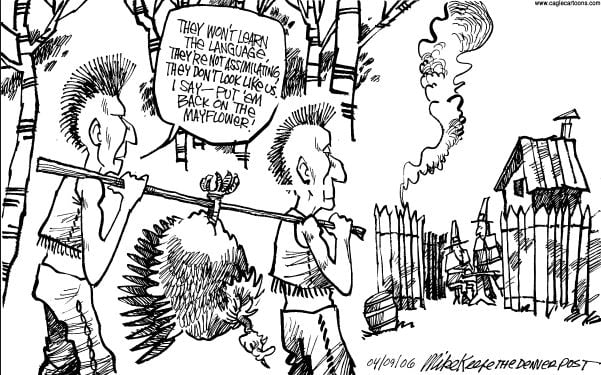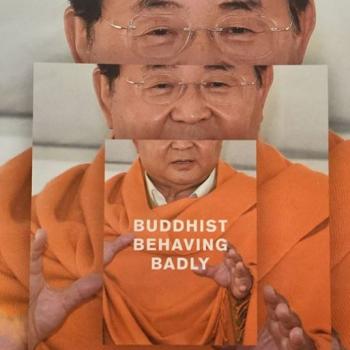For the first time since 1964, the US immigration system could undergo a shift away from a preference to unite families and toward a system that favors foreigners based on their skill and merit. Both houses of Congress are currently debating bills that could make their way to President Obama before August.
What would a Buddhist immigration policy look like for the US (or UK)? Obviously such notions as generosity (dana) and nonviolence (ahimsa) should come to mind. Or perhaps we should look to Shantideva’s simile of the hand and the foot: urging us to reach out and help others because we are all ultimately interconnected. People may also like to stretch analogies regarding the Buddha as one who broke down barriers such as caste and gender, teaching openly to all and proclaiming the same spiritual potential in all beings.
It seems that little will be found in the early Buddhist sources to condone exclusionary practices of any kind. If anything, it may be the strategy of the anti-immigration Buddhist to say that the Buddha was a bit naive in regards to these issues, and that immigration represents a special case in which it really would be better for everyone (thus an act of compassion) if big walls and even bigger prisons were erected in wait for those ‘huddled masses’.
Amy Chua, a Yale Law professor famous (or infamous) for her book Battle Hymn of the Tiger Mother, wrote a 2007 article on US immigration worth revisiting. It contains five recommendations (read the article for details):
1 Overhaul admission priorities – skills not family-ties should come first.
2 Make English the official national language.
3 Immigrants must embrace the nation’s civic virtues.
4 Enforce the law.
5 Make the United States an equal-opportunity immigration magnet.
These are interesting suggestions and deserve some thought:
- Focusing more on skilled workers sounds good, but I wonder if this wouldn’t actually dissuade many skilled workers from coming here in the first place. Americans are famous for geographic mobility: families don’t stick together in the US. This is not the case most places. A brilliant computer scientist in India is more likely to choose to languish there in a sub-par job rather than travel half-way around the world with little or no chance of bringing his (extended) family with him – family is simply a stronger deciding factor. I agree with Chua that more attention to job-skills should be made, but I think it goes too far to say ‘the immigration system should reward ability and be keyed to the country’s labor needs — skilled or unskilled, technological or agricultural.’ Focusing too much on these people as ‘skilled or unskilled’ etc. risks losing sight of their humanity. Non-Americans, like Americans, should not be thought of simply as workers or laborers. Along with continuing to help keep families intact, we should be looking at ways to open borders more for community activists and others whose value cannot be so easily monetized.
- Adopting an official language seems absurd to me. English is already de facto our country’s language, but ever since its inception our nation has been a host to countless other non-native languages (and of course a whole host of Native American ones!). The Buddha, in sending out his students to teach others, told them to teach in the language common to each area. This is in direct opposition to the Brahmans, who taught and preserved their scriptures only in Sanskrit. Thus a Buddhist policy would:
- Inspire, not legislate, others to learn English. This once-great language seems to be producing more trashy pop-music than classical literature today. Learning English as a second language is hard; I’d rather we focus on incentives (carrots) than punishments (the stick). This means greater funding for higher education, arts, and humanities.
- Learn more languages ourselves! Sure, English will stand as the most common language, but as the ACLU argues, it doesn’t make sense to limit the use of other languages. I think the great French Philosopher Merleau-Ponty was right in suggesting that the language must be correct to express the life of the speaker. Languages change with history, some simply die out as speakers adopt a more dominant or useful language. I say: bring on the Spanish, bring on the Chinese (Mandarin)! Let them shape a stronger English, or replace it.
- Chua states that ‘It’s up to each immigrant community to fight off an enclave mentality and give back to their new country.’ I fully agree. But I think the job isn’t just for them. Americans need to make a habit of reaching out to people outside the mainstream. We, too, should go into the enclave as much as they should come out! Not to mention the Americans who are rapidly building enclaves of their own (gated communities) to keep new immigrants out.
- It’s hard to argue against enforcing the law. However, we should also be looking at what compels many people to risk their lives and freedom crossing into the US illegally. Could it be that our own economic policies perpetuate injustice and poverty in their countries? Could our political and military actions be undercutting democratic movements and propping up unpopular and oppressive dictators? …. Where ever that is the case, we should work hard to reverse it, ensuring better lives to people in those countries. If their lives are better in their home country, then I’m sure they’ll be more patient with the legalities of proper immigration.
- Finally, Chua suggests equal-opportunity immigration, stating that ‘The starkly disproportionate ratio of Latinos — reflecting geographical fortuity and a large measure of law-breaking — is inconsistent with this principle.’ I’m all for equal opportunity, but I think ‘geographical fortuity’ should be given more credit. Practically speaking, I think it just makes more sense that we have disproportionate numbers of Latinos. All things considered, if I were, say, an English-speaking political exile from Burma in search of new opportunity, I’d probably want to go to India or Australia. There would have to be some special reason for me to want to go all the way to America. Likewise a Romanian student would feel more geographically compelled to study in England over the US. Just as in point one where I’d say that ‘family matters,’ here also I would say that ‘geography matters. ‘That is not to say that we shouldn’t reach out to our brothers and sisters in Burma and elsewhere. But perhaps we can stretch Shantideva’s simile a bit and say that there are many thorns in the body, and unless one in the foot is particularly bad, it just makes more sense to pull out those that are nearest. In practical terms if we can reduce more suffering in Honduras than Burma simply because it is nearer, we should.
As with most things in politics, the immigration debate sparks many emotions and far more complex than a few paragraphs can give justice to. One of my favorite statements on the topic came from a cartoon on a professor’s door near mine back at The University of Montana (where I did my BA and some MA work in Philosophy). It featured a pair of Native Americans outside a colonists’ fort:
Right…
To me one of the greatest American values has been the value of opportunity for everyone here. The opportunity to make something of their lives, to create new community, and to pass that forward to the next generation. Perhaps, contra Buddhism, that value has been translated into commercialism and greed. But it could also be translated into deeper opportunities for service, for realizing our interconnectedness, for overcoming ignorance.
It is a fact that some amount of material sustenance is necessary for spiritual development. It is also taught by the Buddha that attachment to material possessions will hamper that development. A vast number of Americans today suffer not from too little material wealth (and hence real fear of immigrants taking it away), but instead from too much. It is much of the rest of the world that has too little. It seems obvious that a Buddhist immigration policy would look to eliminate this imbalance.
*This is a revised edition of a 2007 post, but worth re-working, I think, based on current discussions/debates in both the US and the UK.
Read E.F. Schumacher’s “Buddhist Economics,” first published in Asia: A Handbook, edited by Guy Wint, published by Anthony Blond Ltd., London, 1966.












